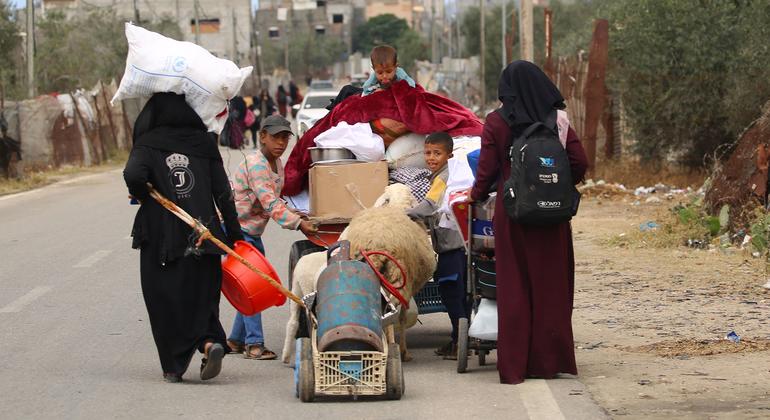Commissioner-General Philippe Lazzarini expressed concern over the situation in Rafah, where nearly half of the population, or 800,000 people, have been forced to flee to so-called safe zones following evacuation orders. However, he highlighted that these areas lack safe water supplies and sanitation facilities, leaving people exposed and vulnerable without protection. The town of Al-Mawassi, where many have sought refuge, is described as lacking the minimal conditions to provide emergency humanitarian assistance in a safe and dignified manner. With more than 400,000 people crammed into this area, there is limited capacity to absorb additional displaced individuals.
Lazzarini emphasized that there are no safe zones in Gaza, refuting claims that people can move to humanitarian areas for safety. He stressed that civilians face serious risks each time they are forced to flee, as the lack of aid and basic supplies exacerbates the humanitarian crisis. With key crossings into Gaza closed or unsafe to access due to their proximity to combat zones, the distribution of essential items such as food and fuel is severely hindered. Only a limited number of aid trucks have been able to reach southern Gaza, highlighting the urgent need for safe and efficient aid delivery methods.
The recent installation of a floating dock by the United States military has allowed for some food supplies to be transported to Gaza, including high-energy biscuits for distribution by the World Food Programme. However, Mr. Lazzarini emphasized the importance of re-opening land crossings into Gaza to ensure the flow of humanitarian assistance. Without access to these routes, the deprivation of aid and worsening humanitarian conditions will persist, further endangering the lives of civilians in the region. The Commissioner-General called for urgent action to address the critical needs of the displaced population and alleviate their suffering.
As the conflict in Gaza continues, the lack of safe passage and protection for civilians remains a pressing concern. Mr. Lazzarini highlighted the challenges faced by those forced to flee their homes, with limited resources and infrastructure in the areas they seek refuge. The urgency of reopening land routes for aid delivery was emphasized, as this remains the most viable and effective method to address the growing humanitarian needs and displacement crisis in Gaza. The Commissioner-General’s call for action underscores the need for immediate support and intervention to alleviate the suffering of those affected by the ongoing conflict in the region.
In conclusion, Commissioner-General Philippe Lazzarini’s remarks shed light on the dire situation facing the displaced population in Rafah and other areas of Gaza. The lack of safe zones, adequate infrastructure, and humanitarian assistance compounds the challenges faced by civilians seeking refuge from the conflict. Urgent action is needed to reopen land crossings, ensure the safe distribution of aid, and address the critical needs of those affected by the crisis. The Commissioner-General’s call for support underscores the importance of international cooperation and assistance in alleviating the suffering of the displaced population in Gaza.









